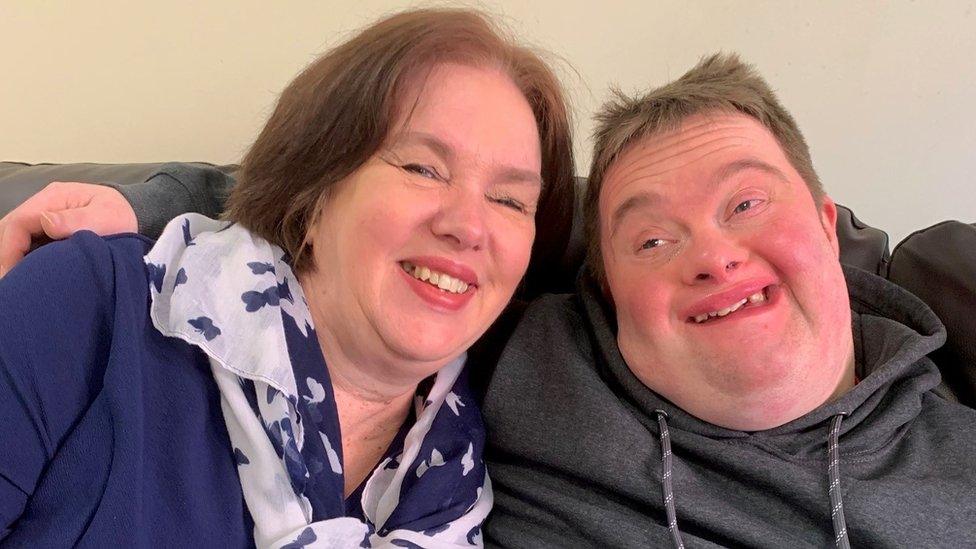Darlington man with MS suffering through lack of carers
- Published
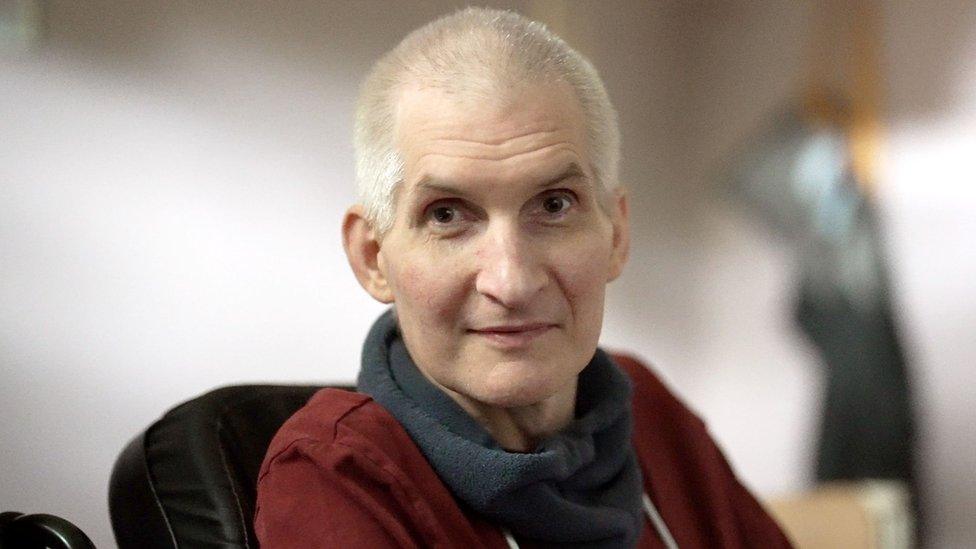
Duncan was diagnosed with multiple sclerosis (MS) 18 years ago
The shortage of carers working in people's homes has more than doubled in the past decade, yet in recent announcements the government has made no mention of tackling the problem. The BBC has spent six months with a man and his family to see how the system is failing them.
Duncan Taylor's flat is his world.
His days are dictated by a routine of regular medication, washing and eating.
Much of his time is spent in dark rooms because he can't bear bright light.
It's a far cry from the life he had as a young man who loved to travel and see live music.
He had just found his dream job in finance when, at 30 years old, he was diagnosed with multiple sclerosis (MS).
It's a debilitating autoimmune condition that has a wide range of symptoms and effects, and though some are treatable, there is no cure.
Duncan has been robbed of his mobility, sense of taste and smell and much of his sight.
"My memory's very bad, I can't even remember this morning. One of the gifts that MS gave me," he jokes sadly.
Duncan, now 48, is entitled to specialist care 24/7, funded by the NHS and worth about £5,000 a week.
But this regularly doesn't happen because there are not enough workers with the skills to support his complex needs.
Instead his untrained and unpaid parents, who are both in their 70s, have to cover some of his personal nursing care.
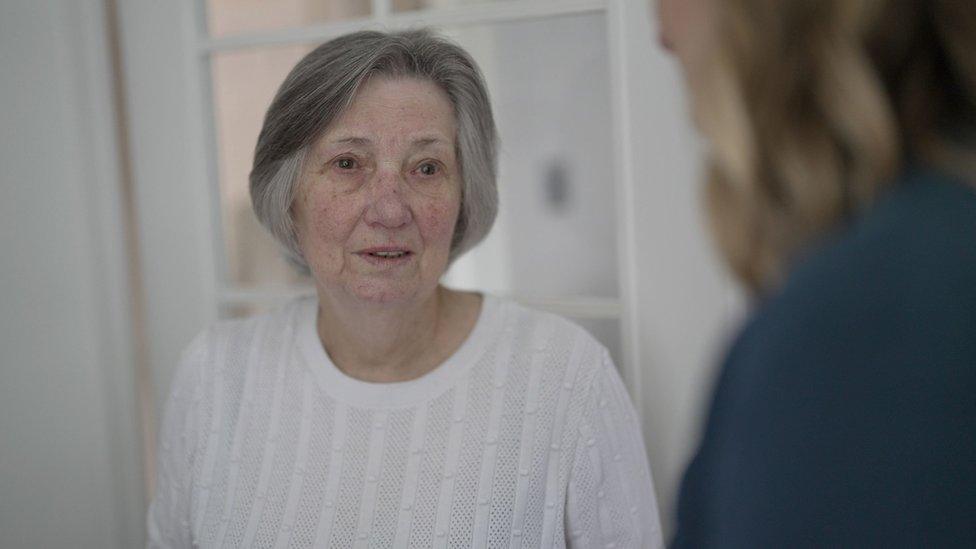
Duncan's mother Sylvia said her son needs consistent carers
"He must have had two to three hundred carers through his home," his mother Sylvia, 74, says, adding: "Many of them have come just because there was nobody else.
"How does he feel about people seeing him lying naked when he hasn't even spoken to them face to face?"
Duncan, from Darlington, was on his seventh care company in five years when we first started following his story in the spring of 2023.
Sylvia has documented it all, from handwritten diaries to old rotas riddled with gaps and last minute changes.
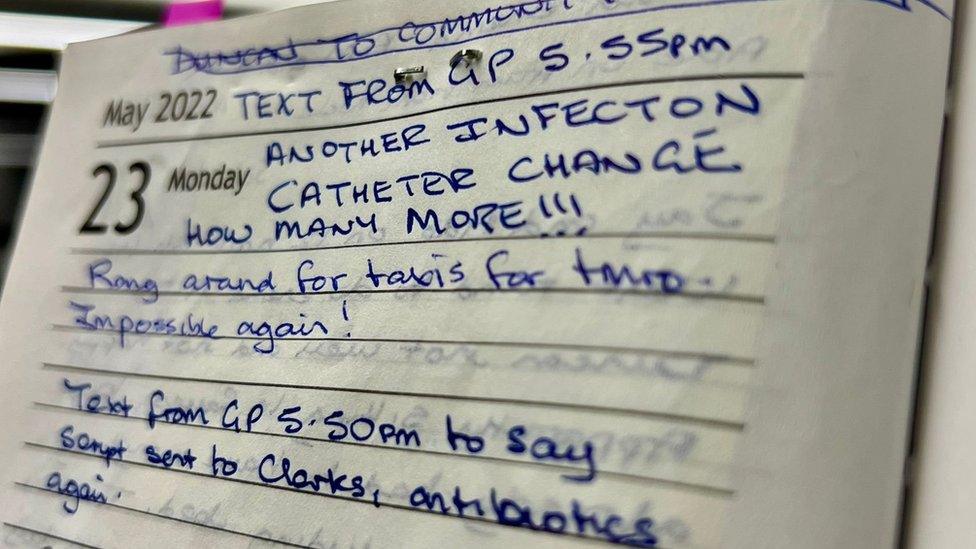
Sylvia has documented Duncan's experiences
She also filmed videos on her phone of her son crying out in pain as he was moved incorrectly by his carers.
"I asked one carer where did she do her training for moving and handling and her reply was that she had done it online which just seemed ridiculous," she says.
"Why are care companies allowed to take these complex care packages when they can't staff and train them properly?"
According to Skills For Care, external, there were about 23,500 home care vacancies in 2012-13 and 71,000 in 2022-23.
The government says it has made money available to local authorities to help improve the care workforce.
The relentlessness of the situation has had a devastating impact on Duncan's mental health.
"I used to have a lady and she was great because she knew exactly what to do and she would make me laugh as well," he says.
"I will take the extra pain now because I don't have a choice. Unfortunately, I have a horrible feeling of just giving in."
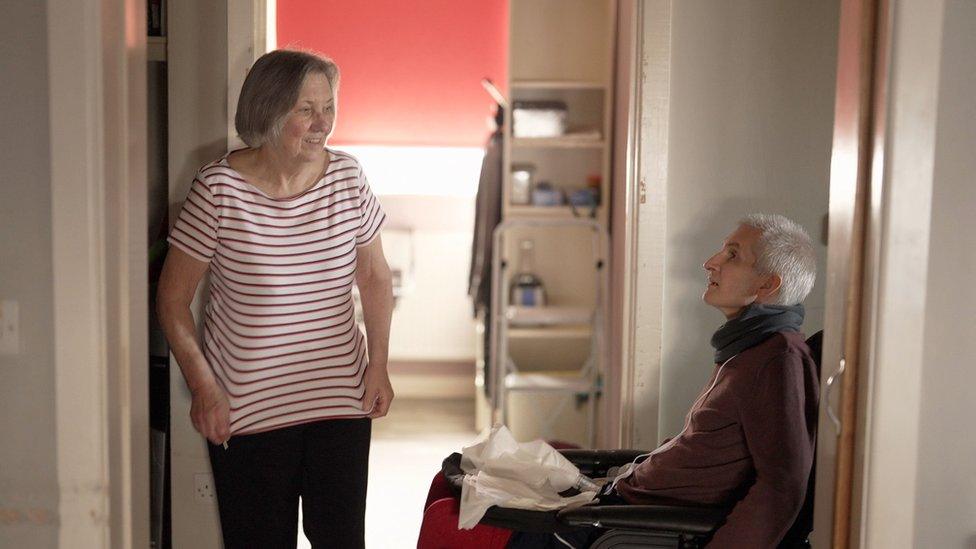
Sylvia is concerned about who will care for her son when she no longer can
Weeks after that conversation, Duncan was rushed into hospital with a potentially dangerous chest infection.
The doctors said they were also concerned about three pressure sores which hadn't been treated properly for more than a year.
Constant sitting and being moved with a hoist had badly damaged his skin, with one sore becoming a large deep wound.
"My worst fear is they get infected, it could really be fatal," Sylvia says.
As the months passed, the sores worsened.
Sylvia desperately sought advice from a private plastic surgeon who described the worst wound as a "deep cavity" down to the bone.
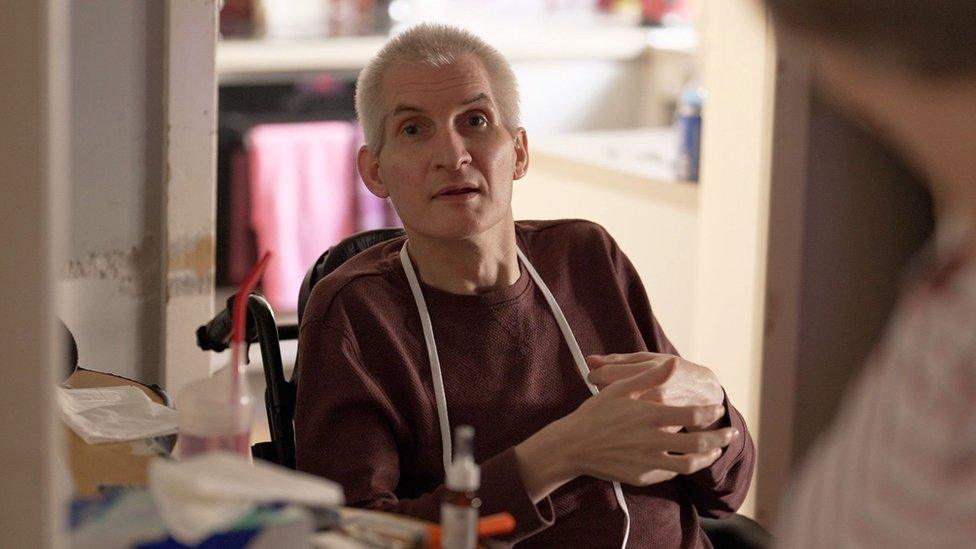
Duncan is entitled to 24/7 care
With Duncan's permission, Conservative MP and social care advocate, Damian Green, has seen pictures of the sores.
"The only human reaction is that's terrible, that shouldn't be happening," he says.
Speaking about the family's struggle to find the right carer, Mr Green adds: "What's really frustrating is that those real-life experiences are common and are likely to get more widespread.
"We really, really need to do something about it."
When it was put to Mr Green that his government had been in power for 13 years, he responded: "Successive governments have done things, but not enough."

The story of families trying to find care for their children.

The disability charity Sense called Duncan's sores a "disturbing" sign that his basic needs, such as washing and dressing, were not being met and should never happen with proper care.
Duncan's local NHS team, the NHS North East and North Cumbria Integrated Care Board, says it is delivering a comprehensive plan and was very sorry to learn of the family's concerns.
Then, out of the blue one day, Sylvia received an email from the care company.
They were terminating the contract.
The family faced an anxious wait while team number eight was found.
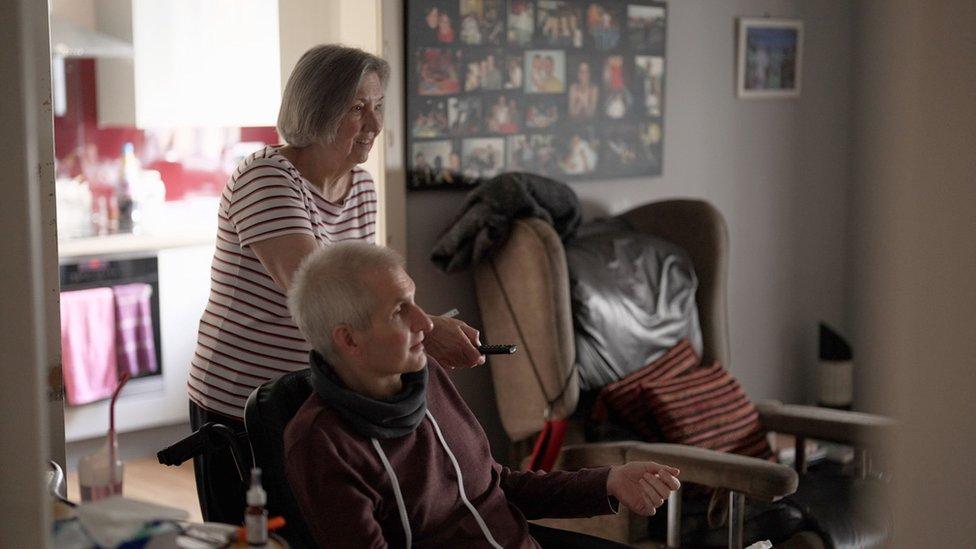
Duncan spends almost all of his time in his flat
The handover process did not run smoothly and at one point it was unclear who would be caring for Duncan in the coming days.
In the months that we've followed Duncan, he's only ever left his flat for medical appointments - that is, until his beloved teenage nephews and brother visit one afternoon.
It was a cold day so his time outside was brief, but it was a precious moment of normality.
The man who had once hoped to have children of his own, smiled and laughed as the boys excitedly told him about their latest rugby match and geography trip.
"I like hearing about what they're doing now. Its nice to hear good things are going on," he says.
He even agreed to pose for a photograph for Sylvia.
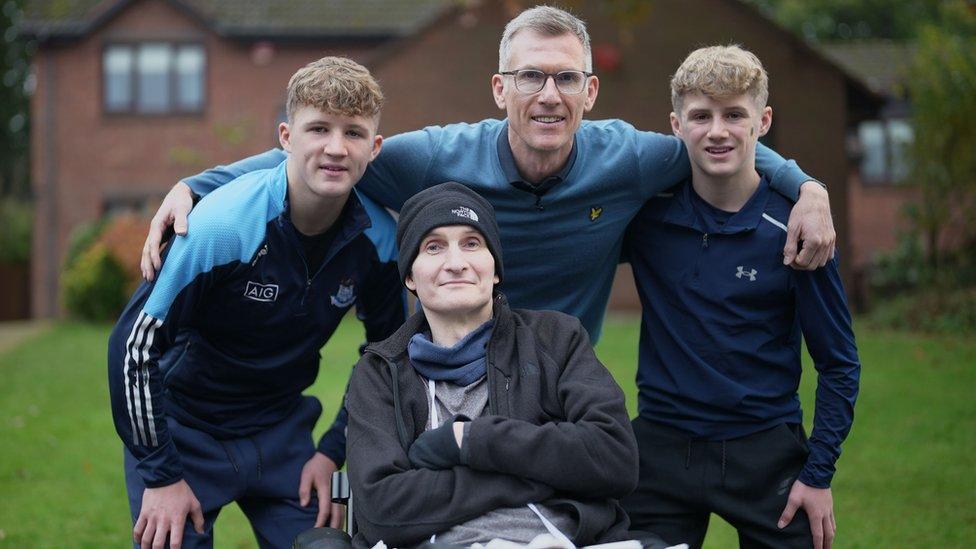
Duncan loves meeting up with his brother and nephews
It was a thank you to the mum who has never given up, but who has also been haunted by what will happen to her son when his parents are no longer there.
"I will fight till my last breath to do anything for him to make his life better," she says, "but there's only so much that we can do."
"The whole process is exhausting. I'm speaking not just for Duncan, but for people who can't do it themselves. To bring to attention what's going on."
Duncan is now being cared for by company number eight, but still with regular help from his parents.
He is getting intensive treatment for his sores, which are beginning to heal for the first time in over a year.
The Department of Health and Social Care said it had provided £8.1bn to local authorities to tackle care pressures, with £570m of that to improve adult social care by "boosting the workforce".
A spokesman said the government had "seen signs of improvement" with a 2% decrease in the number of vacancies between the year ending March 2023 and the previous 12 months.

Follow BBC Tees on Facebook, external, X (formerly Twitter), , externaland Instagram, external. Send your story ideas to northeastandcumbria@bbc.co.uk, external.
Related topics
- Published25 September 2023
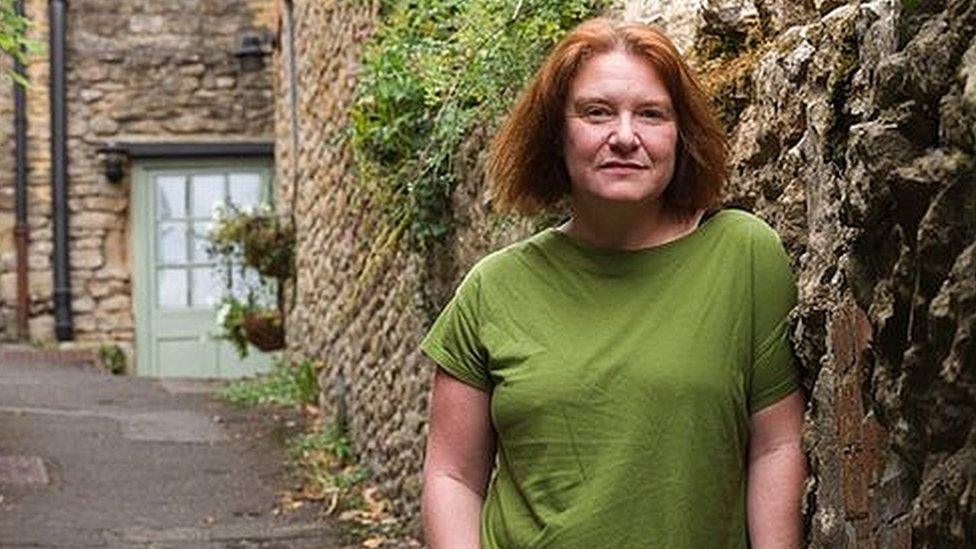
- Published31 July 2023
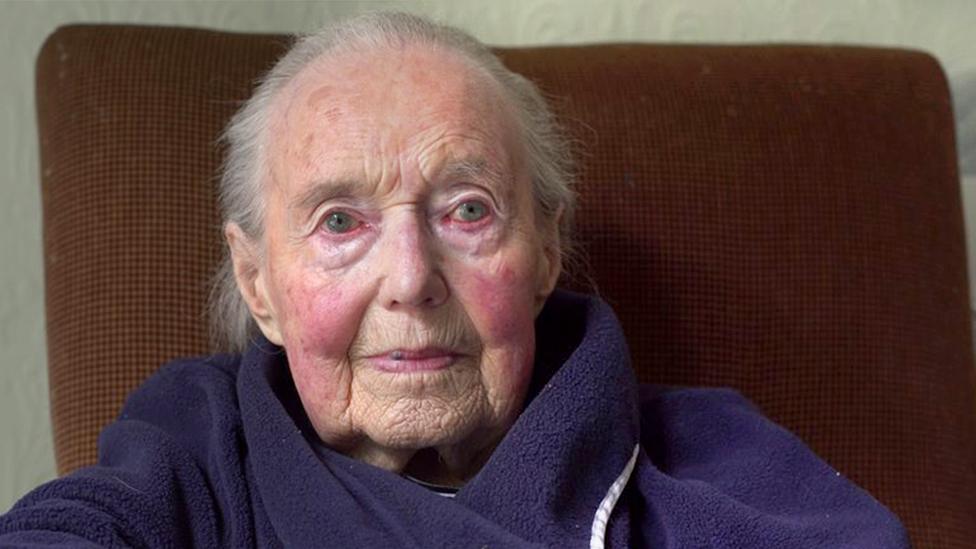
- Published20 February 2023
